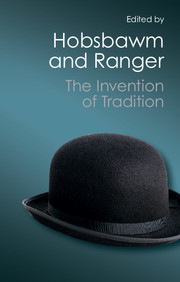Book contents
- Frontmatter
- Contents
- Contributors
- 1 Introduction: Inventing Traditions
- 2 The Invention of Tradition: The Highland Tradition of Scotland
- 3 From a Death to a View: The Hunt for the Welsh Past in the Romantic Period
- 4 The Context, Performance and Meaning of Ritual: The British Monarchy and the ‘Invention of Tradition’, c. 1820–1977
- 5 Representing Authority in Victorian India
- 6 The Invention of Tradition in Colonial Africa
- 7 Mass-Producing Traditions: Europe, 1870–1914
- Index
3 - From a Death to a View: The Hunt for the Welsh Past in the Romantic Period
Published online by Cambridge University Press: 05 July 2014
- Frontmatter
- Contents
- Contributors
- 1 Introduction: Inventing Traditions
- 2 The Invention of Tradition: The Highland Tradition of Scotland
- 3 From a Death to a View: The Hunt for the Welsh Past in the Romantic Period
- 4 The Context, Performance and Meaning of Ritual: The British Monarchy and the ‘Invention of Tradition’, c. 1820–1977
- 5 Representing Authority in Victorian India
- 6 The Invention of Tradition in Colonial Africa
- 7 Mass-Producing Traditions: Europe, 1870–1914
- Index
Summary
MERRIE WALES AND ITS PASSING
When one looks at the cultural life of Wales in the eighteenth and early nineteenth centuries one is struck by a paradox; on the one hand the decay or demise of an ancient way of life, and on the other an unprecedented outburst of interest in things Welsh and highly self-conscious activity to preserve or develop them. The Welsh historian Peter Roberts wrote a survey of the old way of life in 1815, in which he observed
When, from political or other causes, the manners and customs of a nation have, in general, undergone a great change, an inquiry into what they have been in former ages becomes interesting.
Nearly all Welsh picturesque customs were ‘now wholly laid aside’, and some druidic beliefs had never been held at all. The Hon. John Byng visited Bala in 1784 and again in 1793 and complained that ‘Within ten years there seem'd an alteration in the manners of the people.’ Signs of Welsh merriment were gone, the Welsh were becoming like the English, and all the curiosity of travel was undone. Decay and revival are curiously intermixed, because very often those who bewailed the decay were the very ones who brought about the revival. R. T. Jenkins said that the eighteenth century was not so much the century of the Methodist Revival as the century of revivals: educational, agrarian, industrial and cultural; the Welsh Renaissance or antiquarian revival being if not the most massive certainly the most original.
- Type
- Chapter
- Information
- The Invention of Tradition , pp. 43 - 100Publisher: Cambridge University PressPrint publication year: 2012
- 11
- Cited by



